Stany Coppet is a French actor. Born 22nd june 1976. Single.
Stany Coppet is a French actor. Born 22nd june 1976. Single.
In 2003, he left Paris for New York City where he studied acting, dancing and singing at the Lee Strasberg Theatre Institute. On stage in New York, he performed at the Repertory and the Century Center for the Performing Arts. Then, along with Steven Adams and Steven Soderbergh, he co-produced Roger Guenveur Smith's solo performance "Who Killed Bob Marley" at the Bootleg Theater in Los Angeles. Coppet is the creator of the show "From slavery to freedom (Speeches and poems on colonialism and slavery)" produced for the first time in French Guiana, then at the City Hall of Paris and for the U.S. Embassy in Paris. [1]
In 2010, Coppet was in the movie "Orpailleur" by Marc Barrat. The same year for the Spanish cinema in "Aguila Roja" (dir. Jose Ramon Ayerra, prod. Globomedia), Coppet played the part of Claude Acheron, El Mosquetero. In February 2010 he produced and starred alongside Dolores Chaplin, Kasi Lemmons and Vondie Curtis-Hall in his show "From Slavery to Freedom" at the Cantor Film Center in New York. In 2011, in a France 2 biopic of Toussaint Louverture, Stany Coppet played the role of General André Rigaud. In 2013, Coppet joined the cast of the Telecinco series El Príncipe, in the role of Khaled. Coppet also appeared in and co-wrote the film La Vie Pure [2] directed by Jeremy Banster, based on the life of the French explorer Raymond Maufrais, who disappeared in the Amazon forest of French Guiana in 1950. [3]
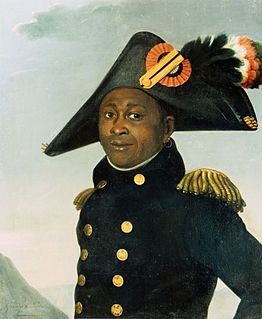
François-Dominique Toussaint Louverture was a Haitian general and the most prominent leader of the Haitian Revolution. During his life, Louverture first fought against the French, then for them, and then finally against France again for the cause of Haitian independence. As a revolutionary leader, Louverture displayed military and political acumen that helped transform the fledgling slave rebellion into a revolutionary movement. Louverture is now known as the "Father of Haiti".

Jean-Jacques Dessalines was a leader of the Haitian Revolution and the first ruler of an independent Haiti under the 1805 constitution. Under Dessalines, Haiti became the first country to permanently abolish slavery. Initially regarded as governor-general, Dessalines was later named Emperor of Haiti as Jacques I (1804–1806) by generals of the Haitian Revolution Army and ruled in that capacity until being assassinated in 1806. He has been referred to as the father of the nation of Haiti.
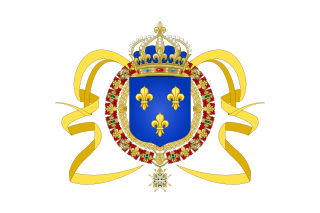
Saint-Domingue was a French colony in the western portion of the Caribbean island of Hispaniola, in the area of modern-day Haiti, from 1659 to 1804. The name derives from the Spanish term for the island, Santo Domingo, which came to refer specifically to the Spanish-held Captaincy General of Santo Domingo, now the Dominican Republic. The borders between the two were fluid and changed over time until they were finally solidified in the Dominican War of Independence in 1844.
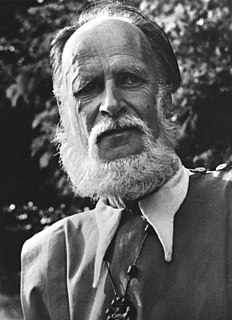
Lanza del Vasto was an Italian philosopher, poet, artist, Catholic and nonviolent activist.

The Haitian Revolution was a successful insurrection by self-liberated slaves against French colonial rule in Saint-Domingue, now the sovereign state of Haiti. The revolt began on 22 August 1791, and ended in 1804 with the former colony's independence. It involved black, biracial, French, Spanish, British, and Polish participants—with the ex-slave Toussaint Louverture emerging as Haiti's most charismatic hero. The revolution was the only slave uprising that led to the founding of a state which was both free from slavery and ruled by non-whites and former captives. It is now widely seen as a defining moment in the history of the Atlantic World.

Victor Schœlcher was a French abolitionist, writer, politician and journalist, best known for his leading role in the abolition of slavery in France in 1848, during the Second Republic.

Thomas-Alexandre Dumas Davy de la Pailleterie was a Saint Dominican Creole general in Revolutionary France. Along with his French contemporary Joseph Serrant, Toussaint Louverture in Saint-Domingue and Abram Petrovich Gannibal in Imperial Russia, Thomas-Alexandre Dumas is notable as a man of African descent leading European troops as a general officer. He was the first person of color in the French military to become brigadier general, divisional general, and general-in-chief of a French army.

The Saint-Domingue expedition was a French military expedition sent by Napoleon Bonaparte, then First Consul, under his brother-in-law Charles Victor Emmanuel Leclerc in an attempt to regain French control of the Caribbean colony of Saint-Domingue on the island of Hispaniola, and curtail the measures of independence taken by the former slave Toussaint Louverture. It departed in December 1801 and, after initial success, ended in a French defeat at the battle of Vertières and the departure of French troops in December 1803. The defeat ended forever Napoleon's dreams of a French empire in the West.
Hubert Koundé is a French actor and film director. Koundé is best known for his role as Hubert in the film La Haine by Mathieu Kassovitz.
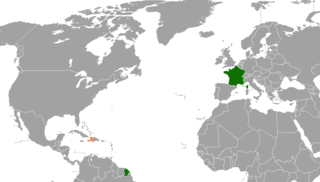
France–Haiti relations are foreign relations between France and Haiti. Both nations are members of the Organisation internationale de la Francophonie, United Nations, and the World Trade Organization.
Marc Henri Benoist better known as Marco de Gastyne was a French painter, illustrator and later film director of more than fifteen films.
FesTVal is the main Spanish annual television and radio festival which takes place in the city of Vitoria Gasteiz in the Basque Country of northern Spain. The festival, an initiative of the Asociación Cultural Fila 2, began in 2009 and runs during the first week of September. The festival program features previews of new shows, special screenings, roundtable discussions, and a ceremony where the Joan Ramón Mainat and Crítics' prizes are awarded. The event is hosted by EITB, the Basque Country public broadcast service. Participating Spanish television and radio networks include TVE, Antena 3, Cuatro, Telecinco, La Sexta, Canal+, and the Disney Channel.
Frank Crudele is an Italian film and theater actor. He has played prominent roles in several television projects, including, Un medico in famiglia , and Gente de mare. He has worked in English, French, and Spanish.
El Príncipe is a Spanish television series of drama and suspense created by Aitor Gabilondo and César Benítez for Telecinco. The series, produced by Mediaset Spain in collaboration with Plano a Plano, is aimed at a young audience. Its plot is centered on the love between a Christian policeman from the Spanish mainland and the young Muslim sister of a drug trafficker. Most of the stories are set in the troubled El Príncipe Alfonso neighbourhood of Ceuta, near the border with Morocco.
Raymond Maufrais was a French journalist and explorer. He disappeared in the jungle of French Guiana; his body was never found.
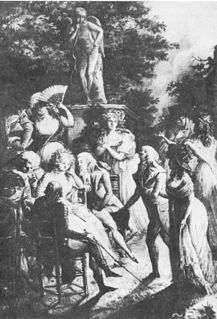
The Coppet group, also known as the Coppet circle, was an informal intellectual and literary gathering centred on Germaine de Staël during the time period between the establishment of the Napoleonic First Empire (1804) and the Bourbon Restoration of 1814–1815. The name comes from Coppet Castle in Switzerland.
Étienne Maynaud de Bizefranc de Laveaux was a French general who was Governor of Saint-Domingue from 1793 to 1796 during the French Revolution. He ensured that the law that freed the slaves was enforced, and supported the black leader Toussaint Louverture, who later established the independent republic of Haiti. After the Bourbon Restoration he was Deputy for Saône-et-Loire from 1820 to 1823.

Rogelio Enrique San Francisco Cobo, better known as Quique San Francisco, was a Spanish actor and comedian. He was a noted figure in the so-called cine quinqui scene.
Perdóname, señor is a Spanish crime drama television series created by Frank Ariza and written by Antonio Onetti, starring Paz Vega, Stany Coppet and Jesús Castro, dealing about drug trafficking in the Coast of Cádiz. It aired on Telecinco from May 2017 to July 2017.
Moyse Hyacinthe L’Ouverture was a military leader in Saint-Domingue during the Haitian Revolution. Originally allied with Toussaint L’Ouverture, Moyse grew disillusioned with the minimal labor reform and land distribution for black former slaves under the L’Ouverture administration and lead a rebellion against Toussaint in 1801. Though executed, the insurrection he directed highlighted the failure of the Haitian Revolution in creating real revolutionary labor change and ignited the movement that drove L’Ouverture from office.